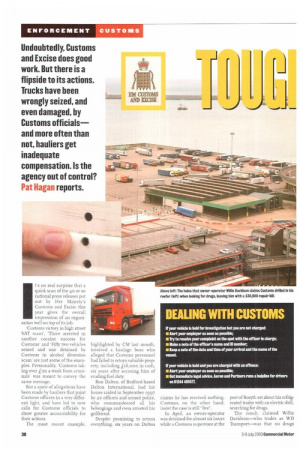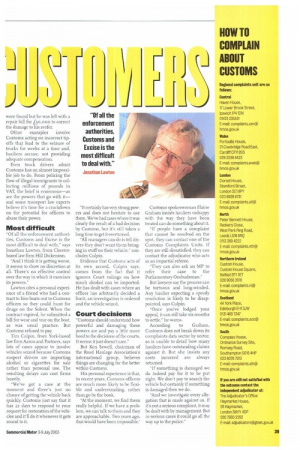t's no real surprise that a quick scan of the
Page 38

Page 39

If you've noticed an error in this article please click here to report it so we can fix it.
40 or so national press releases put out by Her Majesty's Customs and Excise this year gives the overall impression of an organisation well on top of its job.
'Customs victory in high street VAT scam', 'Three arrested in another cocaine success for Customs' and 'Fifty two vehicles seized and one detained by Customs in alcohol diversion scam are just some of the examples. Presumably, 'Customs taking over frm a week from criminals' was meant to convey the same message.
But a spate of allegations have been made by hauliers that paint Customs officers in a very different light, and have led to new calls for Customs officials to show greater accountability for their actions.
The most recent example, highlighted by CM last month, involved a haulage boss who alleged that Customs personnel had failed to return valuable property, including Z16,00ci in cash, six years after accusing him of evading fuel duty.
Ron Dalton, of Bedford-based Dalton International, had his house raided in September 1997 by 20 officers and armed police, who commandeered all his belongings and even arrested his girlfriend.
Despite promising to return everything, six years on Dalton claims he has received nothing. Customs, on the other hand, insist the case is still "live".
In April, an owner-operator was detained for almost six hours while a Customs supervisor at the port of Rosyth set about his refrigerated trailer with an electric drill, searching for drugs.
The result, claimed Willie Davidson—who trades as WD Transport—was that no drugs were found but he was left with a repair bill for £30,000 to correct the damage to his reefer.
Other examples involve Customs acting on incorrect tipoffs that lead to the seizure of trucks for weeks at a time and, hauliers accuse, not providing adequate compensation.
Even truck drivers admit Customs has an almost impossible job to do. From policing the flow of illegal immigrants to collecting millions of pounds in VAT, the brief is enormous—as are the powers that go with it— and some transport law experts believe it's time for a crackdown on the potential for officers to abuse their power.
Most difficult
"Of all the enforcement authorities, Customs and Excise is the most difficult to deal with," says Jonathan Lawton, from Chesterbased law firm Hill Dickenson.
"And 1 think it is getting worse. It seems to show no discretion at all. There's no effective control over the way in which it exercises its powers."
Lawton cites a personal experience of a friend who had a contract to hire boats out to Customs officers so they could hunt for drugs on the Solent. When the contract expired, he submitted a bill for wear and tear on the boat, as was usual practice. But Customs refused to pay.
Tim Culpin, from York-based law firm Aaron and Partners, says lots of cases appear to involve vehicles seized because Customs suspect drivers are importing alcohol or cigarettes for sale rather than personal use. The resulting delays can cost firms heavily.
"We've got a case at the moment and there's just no chance of getting the vehicle back quickly. Customs just say that it has 21 days to respond to your request for restoration of the vehicles and it'll do it whenever it gets round to it. "It certainly has very strong powers and does not hesitate to use them. We've had cases where it was clearly the result of a bad decision by Customs, but it's still taken a long time to get it overturned.
"All managers can do is tell drivers they don't want them bringing in stuff on their vehicle," concludes Culpin.
Evidence that Customs acts of its own accord, Culpin says, comes from the fact that it ignores Court rulings on how much alcohol can be imported. He has dealt with cases where an officer has arbitrarily decided a limit, an investigation is ordered and the vehicle seized.
Court decisions
"Customs should understand how powerful and damaging these powers are and pay a little more heed to the decisions of the courts. It seems it just doesn't care,"
But Ken Sewell, chairman of the Road Haulage Association's international group, believes things are changing for the better within Customs.
His personal experience is that, in recent years. Customs officers are much more likely to be flexible and understanding, rather than go by the book.
"At the moment, we find them really helpful. If we have a problem, we can talk to them and they are approachable. Two years ago, that would have been impossible.' Customs spokeswoman Elaine Graham insists hauliers unhappy with the way they have been treated can do something about it.
"If people have a complaint that cannot be resolved on the spot, they can contact one of the Customs Complaints Units. If they are still dissatisfied, they can contact the adjudicator who acts as an impartial referee.
"They can also ask an MP to refer their case to the Parliamentary Ombudsman."
But lawyers say the process can be tortuous and long-winded. Any haulier expecting a speedy resolution is likely to be disappointed, says Culpin.
"Once you've lodged your appeal, it can still take six months to settle," he warns.
According to Graham, Customs does not break down its complaints data sector by sector, so is unable to detail how many hauliers have outstanding claims against it. But she insists any costs incurred are always returned.
"If something is damaged we do indeed pay for it to be put right. We don't pay to search the vehicle but certainly if something is damaged then we do.
"And we investigate every allegation that is made against us. If it's not a serious complaint, it may be dealt with by management. But in serious cases it could go all the way up to the police."




































































































































































